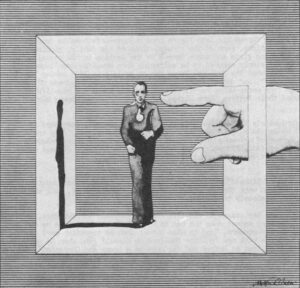Most of us are utterly convinced, in our 20s, that all our notions spring full bloom as if by magic from our own unique selves. My last newsletter described the reactions from people in this age group to ideas about adult development I had advanced in a preliminary article. They argued mightily against any idea that certain crises and concepts or ourselves might be universal at this particular stage in life.
Letterwriters in their 30s and 40s were far less concerned with proving their own uniqueness and more comfortable with commonalties. They were anxious to look deeper into developmental differences between men and women, between cultures and social classes. And they made excellent suggestions for broadening the research:
From a woman in California preparing her doctoral dissertation in clinical psychology based on a study of unmarried men and women between the ages of 30 and 40:
As very little work has been done on the particular problems of the unmarried in this age group your article was a gift from the gods, as it adds a needed perspective. Very synchronous, as it were!
As your article indicated, the developmental stages or crises must be quite different for males and females, and, I suspect would be relevant to the problems and concerns of the unmarried which developmental tasks have they solved or not solved? Can they be solved if they are not married and parenting children? These are some of my concerns.
From a Swiss translator:
Your article has a particular appeal to me since I’m not only struggling to overcome the “Treacherous Age Thirty Transition” but find myself in the midst of an attempt to successfully work out a combination of a domestic and extra-familial career. Since our Swiss society still has the tendency to ideally see a married woman with children at home behind the stove, Swiss women are faced with a few additional obstacles.
It goes without saying that all the crises you describe apply equally to Swiss adults. Adult life here may, in fact, be even more complex. Adult problems are not as openly talked about as in the USA and people have a very strong tendency to accept prescribed roles, whereby “accept” can often be substitute by “suffered” when it comes to women.
A Valentine’s Day note from a male psychologist teaching at two New York colleges:
I love you, and not just because it’s the day for it.
What I love you for, mostly, is that article on growing up adult. It is lively, full of ideas, makes people come alive — we really feel for the people you write about.
Some suggestions: Keep on with the “couples” approach. Levinson, Valliant, etc. are all studying how “he” changes. You are on new ground in studying how “they” grow. You describe men far more than women. But when he is looking for sexual re-affirmation she ray be looking for an intellectual or vocational mentor. How does a woman get a mentor? Keep on exploring growth in women — you have the field almost to yourself.
From a female photographer preparing a book on six women between the ages of 33 and 42:
I’m reminded of the Hindu stages of man — student, husband-father, ran-in-the-world, teacher ran of God. It’s been years since I took Religion 1, but it was something like that. I wonder how it is in a society where the stages are expected?
From a Chicago professor of child development:
My students tend to be very defensive about themselves as “poor” (by American standards) blacks, excluding themselves from these forces. Actually having lived on NY’s Lower East Side for 17 years, lived through family experience after family experience with many an assorted family, my experience tells me these stages are fairly universal. As your work progresses, could you include some studies of blacks — men and women? I was glad to see you had mentioned women quite a bit in your article. I do congratulate you on that. But, I also ask you to keep an eye on the low-income women.
I am so excited by the field of adult development that I am in hopes that your book will produce courses in high schools, colleges, church and community groups across the country like the ones that now thrive in the area of child development. Obviously much has been written on children and adolescents, and now it is “fashionable” to study and turn out articles on old age, death and dying. But we have been left with no guideposts to get through the most important ages of adult life.
From a male student at Fordham University:
Placing these stages in their social context would demonstrate how pervasive are the differences in our society. The obvious contrast is black poor males vs. your and Dr. Gould’s samples. But we might learn as much from contrasting overtly “gay” males vs. the sample group. In experimental jargon — your “treatment” is successful participation in the socio-economic system of the United States. It is a particular treatment that not all of us adults get (especially as you note — women).
From a woman in Arizona — 40-ish, recently divorced, working on her Masters degree in counseling:
I read it with great interest and delight, both because it describes a process I am tip to my neck in myself, and because it is extremely relevant to some work I am doing in graduate school this semester…supportive of my mid-aged creativity…. I am especially interested in how developmental changes such as you describe, possibly modified or accelerated by changing ideas about the female role, are pertinent to family problems.
My women readers — and many men — agreed that much work remains to be done to reach even a rudimentary understanding of female developmental stapes. A sense of urgency came through between every line of their own life experience:
From a woman in Hastings-on-Hudson:
I found myself emotionally exhilarated — had to stop reading every so often just to walk around (like a race horse after running) to cool down. The studies and attitudes — the universality of the ideas presented — pulled together so many loose ends, guilt inducers, self-doubt producers. I’m not sure at this point what I can intellectualize. It just feels right-a clear vision of the human in human being.
You state so clearly what I have been groping towards. Passages ARE my feelings — words used ARE the same I’ve written for myself in darkness. There, in the studies now being done and publicized by you, is a light at the end of what I thought was a long, dark, lonely passage.
I impatiently await your study on the woman’s transition and growth in adult years. The subject of how men and women put it all together is vital in reestablishing some sense of personal order. We have pretty much destroyed the old myths and structures and are searching for something to replace them with. What that something will be, I believe, will come from the continued studies of adult behavior.
A long, thoughtful letter from a 35-year-old mother and part-time counselor in Ohio:
What does happen to women, particularly at the end of the Catch-30 stage? How do you see them resolving the binds of this period? Levinson’s articles and yours tend to concentrate on the way men actually deal with these crises, and how they come, or can come, out of them at the other end. In the case of the women we get left with the actual process DURING the conflict, which arises out of her and her husband’s needs and crises. And again, a lot of her problem, and I guess for women in the Catch 30 phase, seems to be sort of — SECONDARY. I mean her finding her self-hood (as far as it can be separated from dealing with her relationship with her husband), is secondary to cutting through the reactive situation she finds herself in, in relation to HIS crisis.
I suppose, really, that that is what a lot of the whole darn problem is about for women. Right? That these crisis stages are hugely compounded for women. That she has to deal with at least three of what I would REACTIVE identities which are all essentially bound up with the values of intimacy and relationship before she can even begin to deal with herself: i.e., her roles of wife, mother, and third, the social roles she has acquired from her husband….
It seems that at 30, women begin a process, which starts with “what about your doing your own thing now, doing some courses, etc.?”, that mostly has not been able to be resolved till about 40 (though maybe with raised consciousness in women this is changing), because she is still needed to be there for young children, or at least she still has that justification for not dealing with her own fears of getting out into the world. For the couple who did not make it through Catch-30 together, there is a question of the divorced woman first surviving before she can think about self-exploration. And for the still single woman at 30, there seems to be fears of having failed (not having children, not being married).
If all this seems tortuous, it is because I confront it so much in my own life and with people around me, that it is very important, for me to work it through, and you seem to have more clarity about it all than anyone else. So please bear with me!
So it seems to me that many women go through about ten years, not so much of suspended animation, as suspended chaos — and also skipping the Getting into the World bit. As you say that way lies madness!
…If the stages of life will remain a reality, do you see their CONTENT changing, as the roles of men and women continue to change? If a woman has more time earlier to become self-actualized in terms of the world and if a man spends more time with his family, more time in leisure, and being in more situations where he has really to deal with himself, do you see the content of the stages changing? (I have fantasies of incredibly exciting things beginning to happen in people, at the early 40s stages, particularly, if they have had some opportunity to deal with other suppressed parts of themselves earlier.) I see people younger than myself now, much younger, beginning to deal with death and aloneness, developing other facets of themselves. Or are you, Levinson, Erikson and others implying that for all that, these explorations are only surface and minor, and really coming face to face with these issues can only happen later?
From a social work student, preparing a paper on one of Erikson’s eight life stages:
I found your article particularly interesting because the person whom I will be writing about is a 29 year old woman who is in conflict as to whether she should have a third child or continue her education and pursue a career.
And from a.36-year-old New York City woman:
There really is so little that has been said about the development of the female, her expectations about herself and the interaction of those expectations with those of her partner. Your mention of this only whetted my appetite for more. I can’t wait to read the book!
(to be continued)
Received in New York on October 30, 1974.
©1974 Gail Sheehy
Gail Sheehy is an Alicia Patterson Foundation award winner on leave from New York Magazine. This article may be published with credit to Ms. Sheehy, New York Magazine, and the Alicia Patterson Foundation.



